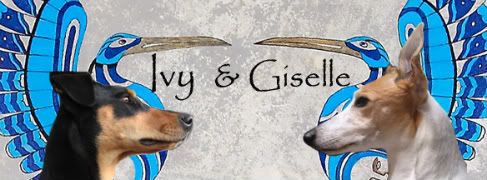We do have a class on nutrition, and today we talked about proteins and how the body used them/broke them down, etc. I learned that after the animal ingests protein, it is then broken down into amino acids and the amino acids are then reconfigured to create NEW proteins needed by the animal. We talked specifically about dogs.
Then I learned something that nearly blew my mind.
Too much protein is bad because it causes your kidneys and livers to work harder.
And the kicker... that there is no difference between plant and animal protein because once the body breaks it down into amino acids it can not tell the difference between "plant" and "animal" proteins.
Imagine the alphabet. The alphabet is made up of letters (amino acids). Depending on how you arrange the letters (amino acids) you get different words (proteins). So the word (protein) "ate" includes the letters (amino acids) "a", "t" and "e". You can take those same letters (amino acids) and create a different word (protein), "eat".
Say "ate" is an animal protein, and "eat" is a plant protein. It doesn't matter which type of protein you are receiving because once they are broken down, they both consist of the same letters, or amino acids.
Therefore... corn isn't necessarily a "bad" ingredient. Neither is grain. They are just cheaper and still contain the essential amino acids, even though the proteins carrying them may be different.
So long as the animal is receiving proteins that contain the necessary amino acids they need, it does not matter what source they are coming from.
And we were also taught that even wolves in the wild weren't 100% carnivores. They are omnivores and included things like grass and bark in their diets.
This completely goes against everything I taught myself about nutrition.
Plus having too many high-protein sources in your foods can make your liver and kidneys work harder getting rid of the excess, which can lead to problems with them later on down the road.
Now I'm wondering if my food really *is* as good as I'd thought it to be originally as when compared to other "grocery store" brands.
Sorry if this was hard to understand... I'm still learning myself. Any thoughts to this or has anyone else took a canine nutrition course so we can "compare notes"?








 Reply With Quote
Reply With Quote ), so it's been a while since I've done anything remotely close to protein synthesis. However, from a few nonchalant courses in health, plants are sources of incomplete proteins. IIRC, only animal products contain complete proteins.
), so it's been a while since I've done anything remotely close to protein synthesis. However, from a few nonchalant courses in health, plants are sources of incomplete proteins. IIRC, only animal products contain complete proteins.

 We did learn about carbohydrates and fats today, too, but I'll save that for a rainy day haha
We did learn about carbohydrates and fats today, too, but I'll save that for a rainy day haha


Bookmarks